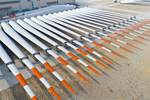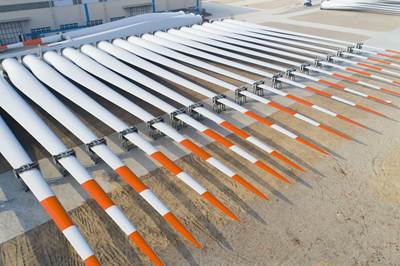U.K. develops Sustainable Composites to address composite recycling challenge
The partnership will accelerate new recycling technologies, such as delivering a series of R&D projects, investing in new material feedstocks and more.

Source | Sustainable Composites
Nadim Zawahi, MP of the U.K. Undersecretary of State for business, energy and industrial strategy, reported on July 3 at the University of Bristol’s Sustainability Summit that it has launched a new initiative called Sustainable Composites. Led by the National Composites Centre (NCC, Bristol, U.K.) and the Centre for Process Innovation (CPI, Wilton, U.K.), the initiative is designed to develop the next generation of sustainable composites by addressing the challenge of recycling composite materials. Zawahi says the partnership between industry, academia and government will harness the U.K.’s composites research and technology development capabilities to capitalize on the rapidly growing approximately £2 billion global market for end-of-life recycling.
The initiative notes that, out of the 110,000 MT of composites produced in the U.K. each year, only 15% of the materials are reused or recycled at the end of their life. Further, it notes that, while composites increase the lifespan of the products to which they are applied, the recycling process is difficult and current recycling techniques often degrade the material’s performance, reducing their value and offering limited applications.
Sustainable Composites is reportedly set to address these challenges by accelerating the development of new recycling technologies in the U.K., simultaneously creating new sustainable composites made from bio-based materials including vegetable waste, corn, nutshells and algae. The Sustainable Composites partnership also plans to deliver a series of R&D projects that bring together companies across the composites supply chain, from materials manufacturers, to chemical suppliers and recycling companies by investigating new material feedstocks (such as bio or waste) and developing product design and manufacturing processes to enable a quicker transition into the supply chain.
“Composites are already supporting sustainability and helping companies meet their low carbon goals.” says Ed Goodman, program lead for Sustainable Composites. “This initiative will harness our composites research and technology capabilities to make zero impact composites a reality. And it will ensure the U.K. continues to lead the way in sustainable materials and capitalize on the opportunities for recycling of valuable materials to protect our resources for future generations.”
Some projects the partnership will initiate include the “Steam to Value Stream” and “Bio-Bolster” project. The “Steam to Value Stream” project is said to be investigating how an innovative steam process developed and patented by SME B&M Longworth (Blackburn,U.K.) can be used to reclaim resin and fibers from a composite component. The team will then explore how these materials can be used in the HiPerDiF technology developed at the University of Bristol — a fiber realignment process that takes discontinuous short fibers and aligns them into ready-to-lay composite tapes to be used in aerospace, automotive and wind turbine manufacturing. The “Bio-Bolster” project is said to explore bio-derived resins for high volume manufacturing applications, and includes developing an understanding of supply chains, design requirements and performance characteristics to produce a material with less impact on the environment.
According to the report, the U.K. is already working toward technologies for composites recycling, including a technology that separates (or disbonds) composite structures quickly and cheaply using a heat source developed by the NCC and Oxford Brookes University (Oxford, U.K.). It will also assess a method to generate added value products from municipal solid waste, a work in progress by CPI and Fibreright (Pontypool, U.K.).
According to Zawahi, this initiative relies on the involvement of organizations from across industry to feed in ideas and shape future work. Companies that would like to get involved are invited to visit www.nccuk.com/sustainable-composites or email sustainable.composites@nccuk.com.
Related Content
Carbon fiber, bionic design achieve peak performance in race-ready production vehicle
Porsche worked with Action Composites to design and manufacture an innovative carbon fiber safety cage option to lightweight one of its series race vehicles, built in a one-shot compression molding process.
Read MoreSMC composites progress BinC solar electric vehicles
In an interview with one of Aptera’s co-founders, CW sheds light on the inspiration behind the crowd-funded solar electric vehicle, its body in carbon (BinC) and how composite materials are playing a role in its design.
Read MoreCo-molding SMC with braided glass fiber demonstrates truck bed potential
Prepreg co-molding compound by IDI Composites International and A&P Technology enables new geometries and levels of strength and resiliency for automotive, mobility.
Read MorePlant tour: Joby Aviation, Marina, Calif., U.S.
As the advanced air mobility market begins to take shape, market leader Joby Aviation works to industrialize composites manufacturing for its first-generation, composites-intensive, all-electric air taxi.
Read MoreRead Next
Wind energy leaders present recommendations for recycling wind turbine blades
The EuCIA, Cefic and WindEurope recently released a joint report aimed to accelerate wind turbine blade recycling efforts.
Read MoreAll-recycled, needle-punched nonwoven CFRP slashes carbon footprint of Formula 2 seat
Dallara and Tenowo collaborate to produce a race-ready Formula 2 seat using recycled carbon fiber, reducing CO2 emissions by 97.5% compared to virgin materials.
Read More“Structured air” TPS safeguards composite structures
Powered by an 85% air/15% pure polyimide aerogel, Blueshift’s novel material system protects structures during transient thermal events from -200°C to beyond 2400°C for rockets, battery boxes and more.
Read More

























